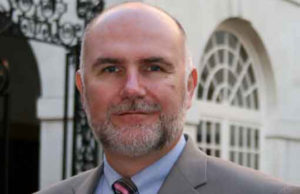 It was a lie. A big lie strewn down the side of a battlebus. A lie, knowingly and cynically peddled, of which there was nothing left but a bad smell within hours of the Brexit result.
It was a lie. A big lie strewn down the side of a battlebus. A lie, knowingly and cynically peddled, of which there was nothing left but a bad smell within hours of the Brexit result.
Doctors are not naive: we have seen promises get broken, forgotten, or quietly melded into “ambitions.” But the claim by Vote Leave that the NHS would receive a Brexit dividend of £350 million a week is a classic of mendacity, even by the low standards of political game playing.
Plenty of people knew it was a lie, and said so. “Beyond irresponsible… a slogan designed to deceive,” was how I put it at the BMA annual representative meeting just before the referendum. “Get that lie off your bus,” was the MP Angela Eagle’s rather more forthright take, in a televised debate.
But, you might think, what does it matter? “Politicians lie” is at the “dog bites man” end of the predictability spectrum. It wasn’t even a difficult one to spot. The reason that the lie still matters is what it revealed about politicians’ attitudes to NHS funding, and, even more importantly, what it revealed about the public’s views.
The £350 million pledge was made by senior politicians who, for years, have been part of a government that has banged on with a familiar mantra about the NHS. The health service is “fully funded,” said the chancellor in his spending review last November, referring to England. This was based on £10 billion of new money, £22 billion of efficiency savings, and, some would say, a belief in the curative powers of pixie dust.
Our work on NHS funding and efficiency savings found the “new” money was less than half of that claimed, and that the “efficiency savings” were little more than cuts. But the government still persisted with its line that somehow the NHS could keep solvent and carry on.
Then along came the referendum campaign, and we suddenly had some of the most ardently hair-shirt wearing apostles of austerity saying that the NHS was not just at the front of the queue for the “savings” when we left the EU, but in fact its sole recipient.
It was a promise that drove a battlebus through the reactionary belief that the NHS had all the money it could ever need, and with a little reorganisation here, privatisation there, would be in a good enough shape.
I wrote to the prime minister last week to tell him it was time to make good on that promise made by his senior colleagues, and endorsed by the people, and give the NHS the extra funding it so desperately needs. I also said how dismayed I was by the appalling accounts of xenophobic abuse directed towards NHS staff and the wider public, and that without the tens of thousands of doctors from outside the UK the NHS would be entirely unsustainable.
Although I was heartened to read, in the response from health secretary Jeremy Hunt, that European workers in the NHS did a “brilliant job,” I was told that decisions on funding would have to wait for the next prime minister.
What the next prime minister will find is a public that is deeply weary of politicians’ promises, but is strongly committed to a properly funded NHS. We do not know if it was the lie about NHS funding “wot won it,” but it was clearly important enough to the successful side in the referendum that they made it their central claim about life after Brexit.
But there is plenty of other evidence too that the public supports—and by implication, would vote for—those who share their commitment to the NHS. A Britain Thinks survey commissioned by the BMA last month found that 81 per cent of the public thought the government should increase NHS funding, while only 4 per cent disagreed.
If the government wishes to conclude from this sorry saga that increasing NHS funding is a vote winner, then some good might come of it. If instead it concludes that the promises were merely forgettable hyperbole, then not only will the relationship between government and governed grow even more toxic, but an NHS in deep crisis will be given nothing but empty promises.
The NHS deserves better. And politicians need to learn they can find success by keeping promises as well as breaking them.
Mark Porter, BMA council chair.
